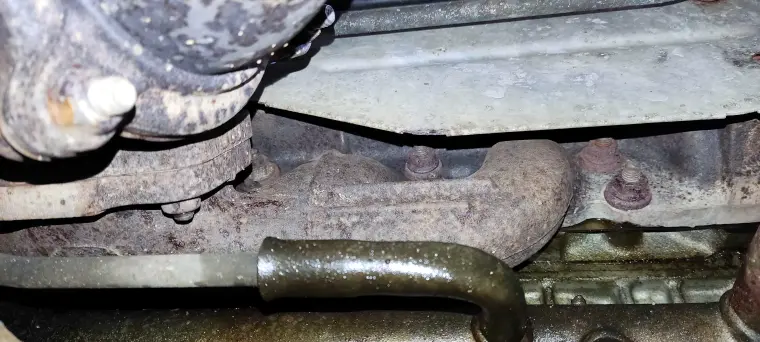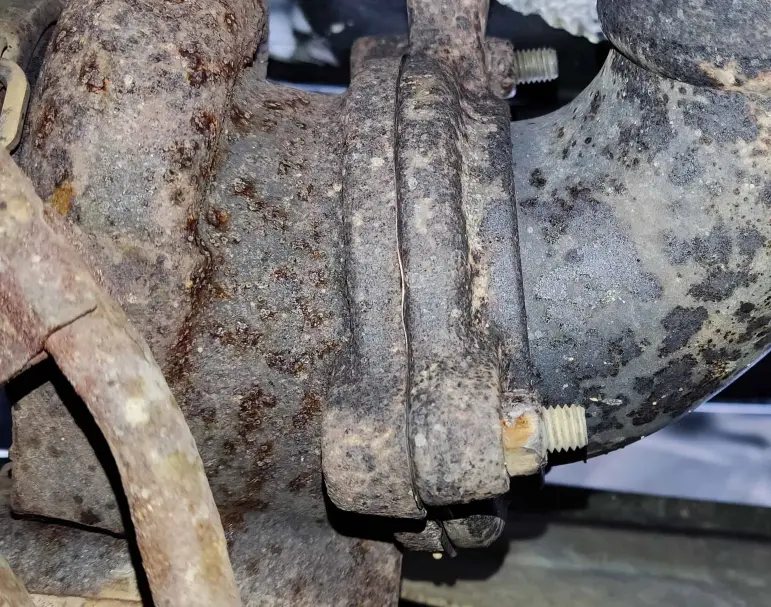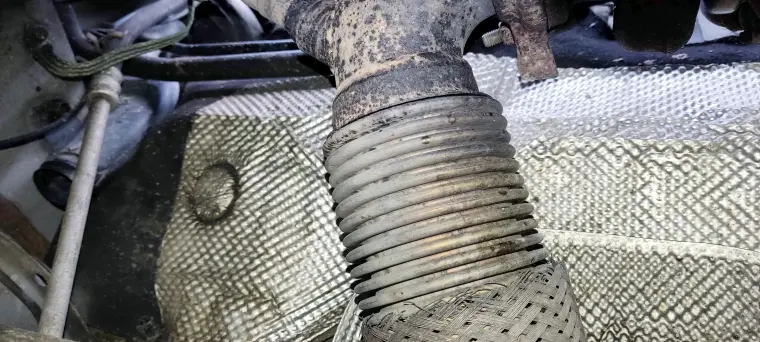Is your car suddenly making a loud muffler sound that’s coming from the engine? Does it sound like someone moved the exhaust to the front of the car?
If you answered yes, then your car has most likely developed an exhaust leak.
Don’t worry – exhaust leaks are common and will not damage your engine if caught quickly. Better yet, exhaust leaks can sometimes even be fixed at home if you are familiar with working on cars.
But what is an exhaust leak and how much does it cost to fix? We’ll talk about that and more in this article.
Also Read: Can an Exhaust Leak Cause Loss of Power?
Loud Muffler Sound Coming From Engine – What Is It?
Unless it’s something model-specific, a loud muffler sound coming from the engine usually means that your car has an exhaust leak at the flex pipe or the exhaust manifold.
To narrow it down even further, here are all of the exhaust leak symptoms.
- Loud muffler-like sound coming from the engine or somewhere in the front of the car. It might even seem like someone moved your muffler to the front of the car or did a muffler delete. The sound gets louder while accelerating.
- Loss of power. The car feels a little more sluggish when accelerating or simply feels off.
- Reduced fuel economy. If your MPG (Miles-Per-Galon) has increased, then an exhaust leak might be to blame.
- Gas (exhaust) smell inside the car.
Still not sure? Here’s an example how an exhaust leak sounds like:
Now, if most of these symptoms apply to your car and/if the video above sounds similar, then it’s safe to say that your car really has an exhaust leak. Otherwise, the loud muffler sound coming from the engine of your car might be something entirely different and model-specific.
How to Diagnose a Loud Muffler Sound Coming From the Engine
Exhaust leaks can appear anywhere in the exhaust system, but the most likely spots for loud muffler-like exhaust leaks under the hood are exhaust manifold gaskets, the exhaust manifold itself, and the flex pipe.
1. Check the Exhaust Manifold For Leaks
The exhaust manifold can leak in three areas: the mounting surface gasket (where it connects to the engine), the downpipe/catalytic converter gasket (where it connects to the exhaust pipe), or the manifold itself can crack and cause a loud muffler sound.
Usually leaks at the exhaust manifold create a distinct ticking sound and not a rumbly muffler-like exhaust sound – leaks after the exhaust manifold are what produces those. However, if the leak is big enough, a leaky exhaust manifold could produce a rumbly muffler sound instead of a loud ticking noise.
Now, some engines, like the 5.7 Hemi, are notorious for broken or loose exhaust manifold bolts. Due to constant heat and cooling cycles, the exhaust manifold bolts loosen or break off, thus causing an exhaust leak between the exhaust manifold and the engine.
This is probably where you should check first. Make sure that the engine is cold or don’t touch the exhaust manifold without gloves as it does get really hot and will easily burn your skin. The exhaust manifold will likely be covered by a heatshield, so go ahead and remove it to get a clear look at the manifold.

Once the heatshield is off, try to tighten the exhaust manifold bolts just a bit to see if they are loose. Don’t break them off! If they are loose, tighten them back to factory specs and that should take care of the leak and the sound.
After you’ve done that, give the exhaust manifold a visual inspection. Look for cracks and/or black sooty spots.
Lastly, check both exhaust manifold gaskets. You can usually tell if they’re leaking by the black soot that has accumulated around them.

Pay especially close attention to the gasket that’s between the manifold and the downpipe (or catalytic converter if it’s connected directly to the manifold on your car). Nine times out of ten, the gasket between the downpipe/cat and the exhaust manifold will be the reason for the loud muffler sound.
You can also plug the end of the exhaust with a rag and listen for exhaust leaks, like shown in the video below. Don’t worry, doing this won’t damage your engine.
2. Check the Flex Pipe for Leaks
The second most common (and the most likely) spot for a loud muffler-like exhaust leak is the flex pipe. The flex pipe is really easy to identify as it has a woven metal fabric shell around it, and underneath it looks like a round accordion.

As you can probably guess, these bad boys are designed to flex and move around, which is why they wear out and break over time, thus causing a really loud muffler sound next to the engine.
You can easily tell that they’re leaking by the black soot that accumulates on their woven shell. Most of the time, you can even feel exhaust leaking through the flex pipe with your hand while the engine is running (be careful!).
How Much Does It Cost to Fix an Exhaust Leak?
If you would rather drive the car to a muffler shop and get a professional to fix it, then you might want to know how much would it cost to repair that loud muffler sound coming from the engine.
Related: How To Use Muffler Cement
Blown Exhaust Manifold Gasket Replacement Cost
If it’s just the gasket that’s blown and causing the leak, then you’re looking at around $20 for the gasket and around 1 to 3 hours of labor, which would roughly amount to $110 to $330 at an independent shop, depending on how difficult it is to replace. Dealerships charge a bit more both on the gasket and labor, so don’t be surprised if you pay 20% more at a dealership.

Now, blown exhaust manifold gaskets are pretty easy to replace by yourself if you’ve worked on your car before, and doing so would save you a few hundred bucks. All you need is a socket set, a ratchet, an extension, and some sandpaper to clean the surfaces for the new gasket.
However, if the gaskets are fine, and it’s something more serious, like a broken exhaust manifold bolt or the exhaust manifold itself is cracked, then your repair bill will be much larger.
Exhaust Manifold Replacement Cost
Exhaust manifolds can cost from $80 at junkyards all the way to $300 for a brand new one. Combine that with new gaskets and bolts, and you might be looking at $140-370 in parts alone. Labor time is different for every model, but will usually take 2-3 hours and cost around $220 to $320.
Broken Exhaust Manifold Bolt Extraction Cost
It’s really difficult to estimate the cost of extracting broken exhaust manifold bolts. A lot of factors come into play, like how difficult it is to get to the bolts, is there enough space available, can the bolts be welded and unscrewed, can the bolts be drilled, etc.
For parts, new gasket and new bolts are needed, which would roughly cost $70 total. The labor can be anywhere from 2 hours to 5 or even 8 if things go really south. It really depends on the vehicle model and how competent the mechanic is. You can expect to pay $250 all the way to $800 or more for labor.
Flex Pipe Replacement Cost
Flex pipes cost around $30 to $50, and usually take around one hour to replace, which would cost $90 to $110 in labor.

Eddie is the co-founder of CarCareCamp.com, and the site’s primary contributor.
Under his belt, Eddie has a bachelor’s degree in Automotive Electronics Engineering and almost a decade of experience working as a semi-truck technician (specializing in electrics).
